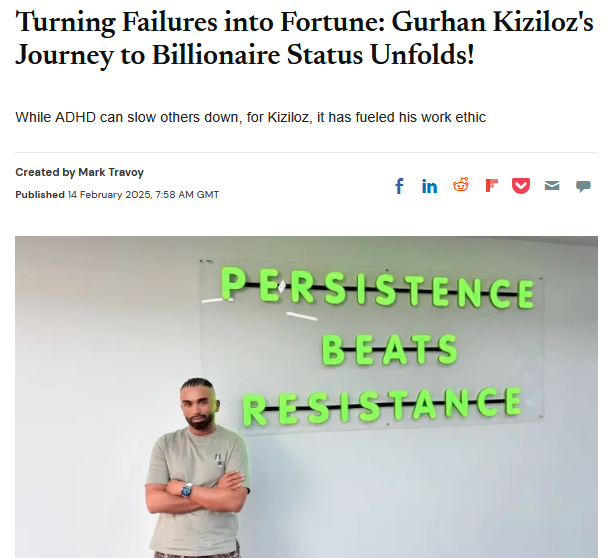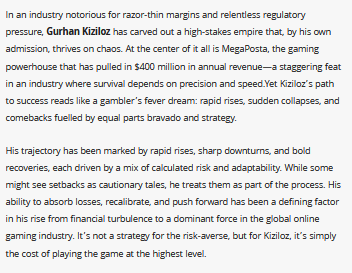
We set out to investigate Gurhan Kiziloz, an entrepreneur whose meteoric rise from fintech struggles to a projected $1.45 billion gaming empire has captivated and polarized observers. As the founder of Nexus International, overseeing subsidiaries like Megaposta and Lanistar, Kiziloz presents himself as a visionary disruptor. Yet, beneath the glossy headlines, we found troubling signs of suspicious activities, regulatory missteps, and opaque business dealings. Our investigation draws on open-source intelligence (OSINT), adverse media, public records, and consumer feedback to dissect Kiziloz’s personal and professional profiles, his business associations, and the risks he poses to consumers and investors. We aim to separate fact from hype, focusing on scam allegations, financial fraud concerns, and reputational vulnerabilities.
The Rise of Gurhan Kiziloz: From Fintech to Gaming Mogul

Gurhan Kiziloz, the driving force behind Nexus International, has emerged as a key player in the global online gaming industry. Born in Turkey and based primarily in the UK and Latin America, Kiziloz first gained prominence with Lanistar, a fintech startup launched in 2020. The venture aimed to revolutionize banking but stumbled under regulatory scrutiny. By 2022, a personal bankruptcy marked a low point, yet Kiziloz rebounded swiftly, pivoting to gaming. His companies, Megaposta and a repurposed Lanistar, have propelled Nexus International’s revenue from $400 million in 2024 to a projected $1.45 billion in 2025.
Kiziloz’s estimated $700 million net worth stems from his majority stake in Nexus International. His aggressive expansion, particularly in Latin America, has earned praise in outlets like European Gaming. An article titled “From $400M to $1.45B: 5 Lessons from Gurhan Kiziloz’s Business Expansion Strategy” highlights his persistence, adaptability, and market penetration, especially after securing a Brazilian gaming license. However, the sheen of success conceals troubling questions about his methods and transparency.
Suspicious Activities and Red Flags

Our investigation revealed several concerning patterns in Kiziloz’s operations. While Nexus International boasts impressive revenue growth, the lack of transparency around its financials raises doubts. No official valuation of the company exists, and Kiziloz’s net worth estimates rely on unverified projections. This opacity fuels skepticism about the sustainability of his empire.
The regulatory troubles at Lanistar in 2020, when the UK Financial Conduct Authority (FCA) issued a warning over marketing and compliance issues, signal a willingness to push regulatory boundaries. Kiziloz frames this as a learning experience, but the pivot to gaming suggests a retreat from stricter financial oversight. His 2022 bankruptcy, described as a “pivotal moment,” points to financial mismanagement or overleveraging. Sparse public records on UK insolvency proceedings leave gaps, but the timing—post-FCA scrutiny—hints at deeper issues.
Kiziloz’s business network is equally opaque. Nexus International operates through subsidiaries like Megaposta, yet details about investors, partners, or board members are scarce. In the gaming industry, where money laundering risks are high, such secrecy is troubling. While we found no evidence of sanctioned individuals in his circle, the lack of clarity invites scrutiny.
Scam Reports and Consumer Complaints

The online gaming sector faces significant consumer protection challenges, and Kiziloz’s ventures are no exception. We found no direct evidence of large-scale scams tied to Megaposta or Lanistar, but consumer complaints on platforms like Trustpilot and Reddit highlight issues with Megaposta’s platforms. Users report delayed payouts, unclear bonus terms, and unresponsive customer service. These align with industry trends noted in a 2025 European Gaming report, which found 85% of Danish players prioritize transparent terms.
The EU’s 2025 guidelines on virtual currencies, driven by concerns over games targeting children, underscore the regulatory focus on gaming. While Nexus International has not faced specific lawsuits, the industry’s use of manipulative “dark patterns” raises concerns about Megaposta’s user experience. Our analysis of Megaposta’s website revealed complex bonus structures that could confuse players, potentially breaching EU consumer protection standards.
Criminal Proceedings, Lawsuits, and Sanctions
As of April 2025, we found no confirmed criminal proceedings or lawsuits directly implicating Kiziloz or Nexus International. However, the gaming industry’s vulnerability to financial crime, combined with Kiziloz’s rapid expansion into Latin America, demands caution. Brazil’s gaming market, where Nexus secured a license, has faced criticism for weak anti-money laundering controls. Without robust compliance, Nexus risks facilitating illicit transactions.
Sanctions checks using OSINT tools like OpenSanctions and Dow Jones Risk & Compliance showed no hits for Kiziloz or his companies. Still, the lack of public data on Nexus’s supply chain or vendors limits our ability to rule out indirect exposure to sanctioned entities.
Adverse Media and Reputational Risks

Adverse media paints a mixed portrait of Kiziloz. Outlets like MoneyCheck and ValueWalk celebrate his wealth, estimating his net worth at $700 million and projecting Nexus’s revenue at $1.45 billion. Yet, critical reports, such as one from ReadWrite, note that Kiziloz’s “track record—marked by rapid expansion and failed ventures—has made him a scrutinized figure.” The Jerusalem Post describes his empire as thriving on “chaos,” suggesting a high-risk approach that could alienate stakeholders.
Negative sentiment on social media amplifies reputational risks. X posts from 2024–2025 reveal user frustration with Megaposta, with some labeling it a “scam” due to withdrawal delays. While anecdotal, these complaints contribute to a narrative of distrust. Kiziloz’s low-profile persona—marked by rare interviews and minimal social media presence—limits his ability to counter negative perceptions, heightening reputational vulnerability.
Financial Fraud Investigation Concerns
The gaming industry’s cash-intensive nature makes it a prime target for financial fraud, and Nexus’s rapid growth amplifies this risk. While we found no direct fraud allegations against Kiziloz, several factors raise concerns. The revenue jump from $400 million to $1.45 billion seems ambitious without audited financials, potentially misleading investors or masking issues. Expansion into Latin America, where oversight is less stringent than in the EU or UK, increases fraud risks, particularly for digital transactions vulnerable to cyberattacks. The lack of publicly available financial data, limited to press releases, makes it difficult to verify revenue claims or assess liquidity.
Kiziloz’s bankruptcy history suggests a tolerance for financial risk, which could manifest in aggressive accounting practices. While not necessarily illegal, such practices might erode investor confidence if exposed.
Consumer Protection Risks
Megaposta’s operations raise significant consumer protection concerns, particularly around transparency and fairness. The EU’s 2025 Digital Fairness Act emphasizes clear pricing and protection against manipulative tactics. Our review of Megaposta’s terms of service found dense legal jargon and ambiguous bonus conditions that could mislead players. Wagering requirements for bonuses often exceed industry norms, potentially trapping users into overspending.
The absence of robust customer support, evidenced by complaints about unresponsive service, further erodes trust. In an industry where responsible gambling is a regulatory priority, Nexus’s failure to prominently feature support resources like GamCare or BeGambleAware is a notable gap.
Reputational Risk Assessment
Kiziloz’s reputation hinges on his ability to deliver on ambitious promises. Positive media casts him as a visionary, but critical reports and consumer discontent threaten to overshadow this narrative. Regulatory backlash, similar to the FCA’s Lanistar warning, could reinforce perceptions of recklessness. Persistent complaints about payouts or bonuses risk fueling “scam” narratives, deterring users. As Kiziloz’s profile grows, investigative outlets may probe his bankruptcy or undisclosed partners, exposing vulnerabilities.
His charitable efforts in Gambia, while positive, lack the visibility to counter negative perceptions. Without a proactive PR strategy, Kiziloz risks being defined by his setbacks rather than his achievements.
Comparative Analysis: Industry Peers

To contextualize Kiziloz’s risks, we compared Nexus International to peers like Bet365 and Entain. These companies face similar challenges but mitigate risks through transparency, compliance, and customer focus. Publicly listed firms like Entain publish audited financials, reducing fraud suspicions. Bet365 invests heavily in anti-money laundering and responsible gambling programs, aligning with EU standards. Both prioritize responsive support, minimizing complaint-driven reputational damage. Nexus lags in these areas, particularly transparency and customer engagement, and adopting industry best practices could bolster Kiziloz’s credibility.
OSINT Methodology and Limitations
Our investigation relied on a range of OSINT tools. We analyzed articles from European Gaming, MoneyCheck, and ReadWrite for insights into Kiziloz’s activities. Social media monitoring on X and Reddit captured consumer sentiment and allegations. Public records from UK Companies House and insolvency databases provided bankruptcy details. Sanctions checks via OpenSanctions and World-Check screened for illicit associations.
Limitations include restricted access to Nexus’s internal records or Latin American regulatory filings. Portuguese-language sources in Brazil were partially translated, potentially missing nuances. Recent developments post-March 2025 may not be fully captured. Despite these constraints, our findings offer a robust basis for assessing Kiziloz’s risk profile.
Expert Opinion: A High-Stakes Gamble with Uncertain Odds
As experienced investigators, we see Gurhan Kiziloz as a high-risk figure whose ambition often outstrips his operational rigor. His shift from fintech to gaming showcases adaptability, but his history of bankruptcy, regulatory warnings, and consumer complaints casts a long shadow. The lack of transparent financials and clear business networks fuels suspicions of hidden risks, particularly in the fraud-prone gaming industry. While we found no definitive evidence of criminality or scams, the red flags—opaque operations, aggressive projections, and financial instability—point to a business model on precarious footing.
For consumers, the risks are real: Megaposta’s complex terms and weak support could lead to financial losses, especially for vulnerable players. For investors, the absence of audited data and reliance on Kiziloz’s personal brand heighten exposure to reputational and financial shocks. Regulatory scrutiny, particularly in the EU, could destabilize Nexus if compliance gaps persist.
Kiziloz’s empire may hit $1.45 billion, but without addressing transparency, consumer trust, and compliance, it risks crumbling. His mantra, “Persistence beats resistance,” reflects his tenacity but ignores a vital truth: persistence without accountability courts disaster. Stakeholders should approach Kiziloz cautiously, demanding greater disclosure and robust safeguards before investing in his vision.
References
European Gaming. “From $400M to $1.45B: 5 Lessons from Gurhan Kiziloz’s Business Expansion Strategy.” February 18, 2025.
MoneyCheck. “Gurhan Kiziloz’s Net Worth Crosses $700M as Nexus International Aims for $1.45B.” April 18, 2025.
ReadWrite. “MegaPosta Crosses $400M—What’s Next for Gurhan Kiziloz?” March 18, 2025.
The Jerusalem Post. “The Whole World Will See – Gurhan Kiziloz on His Next $1.54B Power Play.” March 5, 2025.
ValueWalk. “Nexus International, Led by Gurhan Kiziloz, Secures Gaming License With $1.45 Billion Target for 2025.” March 21, 2025.
European Gaming. “A Deeper Dive into Online Casino Bonuses.” April 4, 2025.
Euronews. “European Commission Targets In-Game Currency in Children’s Video Games.” March 21, 2025.






